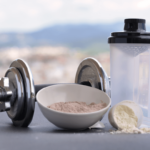You might have noticed your feet swelling and your face looking a little puffier after a night of drinking.
Does this actually mean you’re retaining water? In this article, we’ll lay out what exactly it means to retain water and how alcohol can affect your body in this way.
Jump to:
- What Does It Mean to Retain Water?
- Does Alcohol Make You Retain Water?
- Why Does Alcohol Cause Water Retention?
- How Long Does Alcohol-Induced Water Retention Last?
- Signs You Might Be Retaining Water After Drinking Alcohol
- How Do You Get Rid of Water Retention from Alcohol?
- Can Alcohol-Induced Water Retention Make You Gain Weight?
- Why Does Alcohol Cause Stomach Bloating?
- Can Alcohol Cause Irritable Bowel Syndrome (IBS)?
- Does Alcohol Cause Indigestion?
- How Does Alcohol Affect the Stomach Long Term?
- How Do You Treat Alcohol Bloating?
- How Does Alcohol Affect Edema?
- Does Alcohol-Related Swelling Indicate a More Serious Medical Issue?
- Will I Lose Weight If I Stop Drinking?
What Does It Mean to Retain Water?
Water retention, or fluid retention, as it’s sometimes called is the buildup of fluid in the body. The extra fluid in your body tissue can show up as swelling in places like the feet, ankles, and face. The fluid builds up between cells and tissues throughout your body.
It can occur for various reasons, including hormonal changes, certain medications, high salt intake, heat, prolonged sitting or standing, and certain medical conditions such as kidney or heart problems. Many people notice swollen ankles, feet, or face after consuming too many alcoholic beverages.
When the body retains water, it can lead to swelling or bloating in different parts of the body, such as the hands, feet, ankles, and abdomen. Some common signs of water retention include puffiness, weight gain, tight-fitting rings or shoes, and a general feeling of bloating.
Water retention is often temporary and can be resolved by making certain lifestyle changes, such as reducing sodium intake, increasing water consumption, regular exercise, elevating the legs, and avoiding prolonged sitting or standing. However, if water retention persists or is accompanied by other concerning symptoms, it’s important to consult a healthcare professional for a proper diagnosis and appropriate treatment.
Does Alcohol Make You Retain Water?
Alcohol, especially when consumed in excessive quantities, can make most people retain water in their bodies which manifests itself in the form of swelling. Most of the time, people will notice swelling a day or two after drinking. Drinking higher quantities and more often can increase water retention.
Not everyone will retain water after drinking alcohol. It depends on your lifestyle choices, genetics, and other factors.
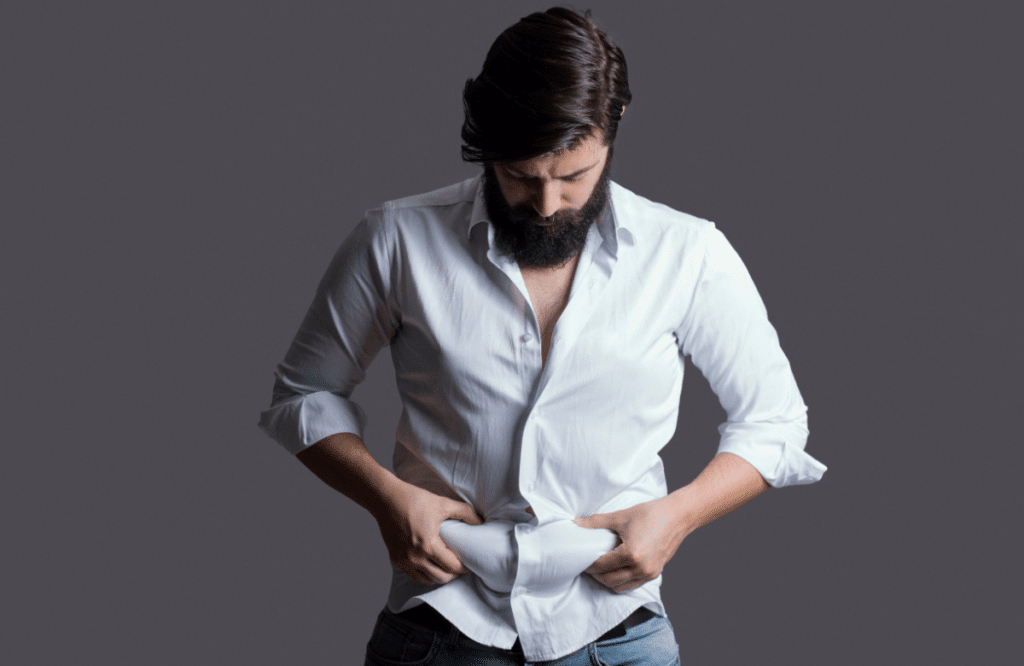
Why Does Alcohol Cause Water Retention?
Water retention may be a symptom of alcohol consumption thanks to a number of reasons. It causes electrolyte imbalances and other functions within your body to work less efficiently.
Alcohol acts as a diuretic making you have to urinate more frequently, which causes you to become dehydrated. When your body becomes dehydrated it starts to store water in places like your vital organs, feet, ankles, and face.
Alcohol can also influence your hormones, including ADH, which is a hormone that aids in releasing urine. As such, your body might retain more fluid rather than releasing it from your body through urine.
Sodium intake can also increase water retention, and alcoholic beverages are often high in sodium.
This doesn’t mean everyone will retain water in the same way. The state of your hydration levels, your genetics, and other aspects of your health and well-being influence the way your body responds to alcohol.
How Long Does Alcohol-Induced Water Retention Last?
You may notice after a night or two of drinking that your face is starting to look a little puffy and your feet and ankles are swollen. How long is that supposed to last?
Alcohol-induced water retention can last anywhere from a few days to a few months. Those who consume no or less alcohol in that period will lose the swelling faster than those who are drinking consistently. Heavy drinking will likely cause retention to last longer.
If it goes on longer than a few months, you may have a more serious condition on your hands and you should seek the care of a doctor to check it out for you.
Signs You Might Be Retaining Water After Drinking Alcohol
Bloating is one of the main signs associated with water retention caused by alcohol consumption. The fluid retention caused by excessive drinking can also show up as swelling in the hands, feet or ankles, puffiness in the facial area, and/or fatigue or lethargy.
If you find yourself unusually tired or you have stiffer and more swollen muscles than normal, these are all signs you might be retaining too much water.
How Do You Get Rid of Water Retention from Alcohol?
While you might think drinking fewer fluids will help your body excrete more water, the exact opposite is true. To get rid of water retention due to alcohol consumption, you should drink a lot of water.
This fixes the dehydration in your body and helps to flush out all of the fluid buildup in your tissues. It tells your kidneys they don’t have to store all that extra fluid and can start functioning better.
Avoiding alcohol also goes a long way in reducing the swelling more quickly. Until the water retention goes away, you also want to avoid sodas, sugary beverages, and beverages containing caffeine, which can also contribute to water retention.
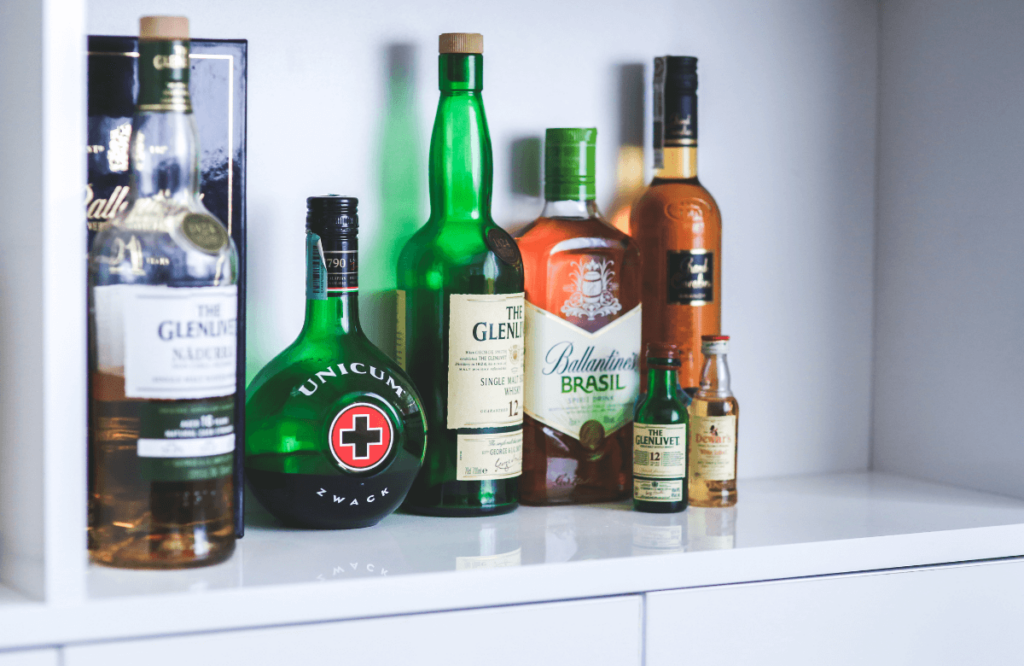
Can Alcohol-Induced Water Retention Make You Gain Weight?
We’ve all heard about the dreaded beer belly caused by excessive drinking. Alcohol in general can cause weight gain due to increased calorie consumption. In addition to adding calories to your daily diet, it also has the added effect of making you retain water, which will definitely show up on the scale.
You can flush away some of that extra weight by drinking more water and avoiding or limiting alcohol altogether. If you’re the type of person that also consumes salty foods at the bar or with your drinks, you’ll most likely notice some extra weight or puffiness within the next day or two.
Why Does Alcohol Cause Stomach Bloating?
If you’ve ever experienced stomach pain after drinking alcohol, you’re not alone. Many people suffer from the effects alcohol has on the gastrointestinal tract.
Alcohol interferes with your body’s natural digestive enzymes produced in your stomach and can also break down the mucous membrane that is designed to protect the stomach lining. These issues can lead to bloating.
Carbonated alcoholic beverages, including beer, can make the bloat worse. Barley, the base ingredient in beer, can cause bloating, too.
Alcohol Dehydrates the Body
Because of its diuretic properties, alcohol can quickly dehydrate your body. It causes water to leave your blood vessels at an accelerated rate and forces your vital organs to begin storing excess water as a preservation method. It’s important to remember to drink plenty of water while consuming alcoholic beverages.
Inflamed Stomach Lining
Because alcohol disrupts your body’s natural healthy gut bacteria it produces some inflammatory effects on the lining of your stomach. The stomach wall becomes inflamed as the special mucus lining designed to protect it is exposed to excessive stomach acids.
Carbonation Causes Bloating
Those carbonated beverages make your drinks bubbly and refreshing passing through your palate, but they can quickly disrupt the stomach lining. Between the excess stomach acid and the inflammatory effects of the carbonation, you’ll notice your belly bloating. The gas bubbles in the carbonated drink puff up your stomach and can become quite uncomfortable.
Air Ingestion in the Stomach
Enjoying salty snacks like nuts and pretzels with your favorite carbonated beverage can increase air ingestion. This can become incredibly uncomfortable as it can cause more bloating and pain in your abdomen. You might consider skipping the carbonation and saltier snacks like nuts to decrease the air you ingest into your stomach.
Can Alcohol Cause Irritable Bowel Syndrome (IBS)?
The cause of IBS is still somewhat of a mystery, and no one thing has been proven as the cause of it. Certain types of foods and drinks, like alcohol, are known to trigger its symptoms, though. Alcohol can worsen IBS symptoms, and you should limit or avoid it altogether if you’re having significant issues.
Does Alcohol Cause Indigestion?
If you’re prone to indigestion already, you’ll want to pay attention to your symptoms while drinking alcohol. Alcohol has been known to cause indigestion and GERD in some people.
Some studies have shown increased stomach acids after consuming alcohol. The excess stomach acid finds its way up to the top of your throat in the form of acid reflux and heartburn.
How Does Alcohol Affect the Stomach Long Term?
Long-term regular alcohol consumption can have damaging effects on your stomach. As we’ve mentioned, it disrupts the digestive process of the gastrointestinal tract, breaks up the mucus lining, and causes bloating and inflammation.
If these conditions are left untreated and you continue to consume alcohol at the same rate it will only get worse. The inflammation can turn into ulcers and cause chronic gastritis.
How Do You Treat Alcohol Bloating?
Bloating can be incredibly uncomfortable, and you might find it’s suddenly hard to button up your pants. If you want to continue to enjoy alcohol without the bloat, take a look below at a few things that might help with this issue.
Start by Preventing It
Beer and other carbonated beverages seem to do the most damage when it comes to bloating. Instead, stick with distilled drinks that contain less sugar and no carbonation like gin, vodka, and tequila without the mixers.
Also, remember to drink plenty of water before, during, and after to help dilute and pass through faster.
Of course, you can always avoid alcohol-related water retention by simply abstaining from alcohol. This choice isn’t for everyone, but it might be wise for those experiencing excessive water retention, edema, and other serious medical issues.
Eat Foods with Anti-Bloat Properties
Certain herbs are great for anti-bloat along with juicier fruits and veggies loaded with water. Think along the lines of cucumbers, watermelon, cilantro, ginger, and parsley to name a few. High protein foods can also pack a punch in helping you not to bloat quite so much.
Here are a few other foods that can help beat the bloat:
- Pineapple
- Papaya
- Fennel
- Yogurt
- Peppermint
- Bananas
- Celery
- Asparagus
- Lemon
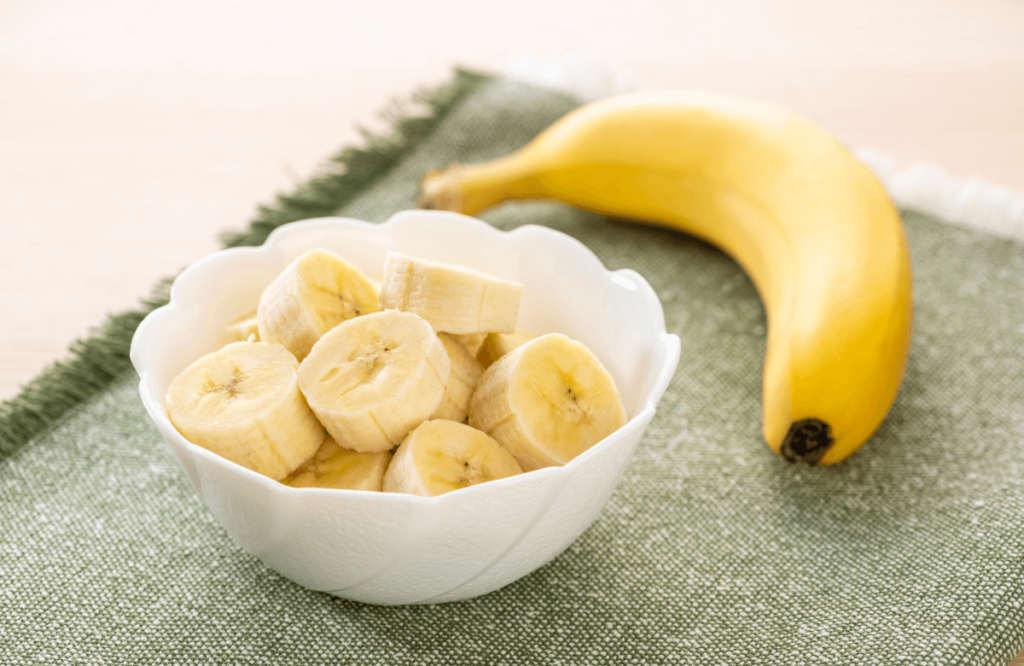
Try Natural Home Remedies
Herbal teas can go a long way in helping relieve and prevent painful symptoms. Try peppermint tea or chamomile to help soothe and prevent bloat in your digestive tract and flush out the excess gas that’s causing you to bloat.
Go for a Walk
Walking can get your blood pumping and move oxygen around your body faster. It can help break up the gas bubbles in your stomach by getting things moving around in there. It can also improve your mood and well-being, helping you to naturally relax and release the tension in your stomach.
Drink Water
Water is the miracle ingredient for all-over health and wellness and can do wonders for preventing bloat in the first place. Having a glass of water throughout the day at approximately 2-hour intervals will help keep your body hydrated and keep gas bubbles from getting trapped in your digestive tract.
How Does Alcohol Affect Edema?
If you think you may have edema or are looking to prevent it, take a look at the points we’ve highlighted below.
Edema Defined
Edema is simply fluid build-up under the skin or, in other words, swelling. It’s more likely to happen in the legs and feet, but it can appear anywhere in your body.
As the fluid collects, it stays trapped in the tissues and can sometimes be a sign of something more serious, like congestive heart failure.
How Alcohol Causes Edema
Alcohol triggers the release of antidiuretic hormones, which causes the body to become dehydrated. You’ll start to experience frequent trips to the bathroom to urinate, which is a sign of rapid water loss.
As your body loses water, its defense mechanism kicks in and starts to build up stores of fluid in your vital organs, like the kidneys, and your body tissue under the skin.
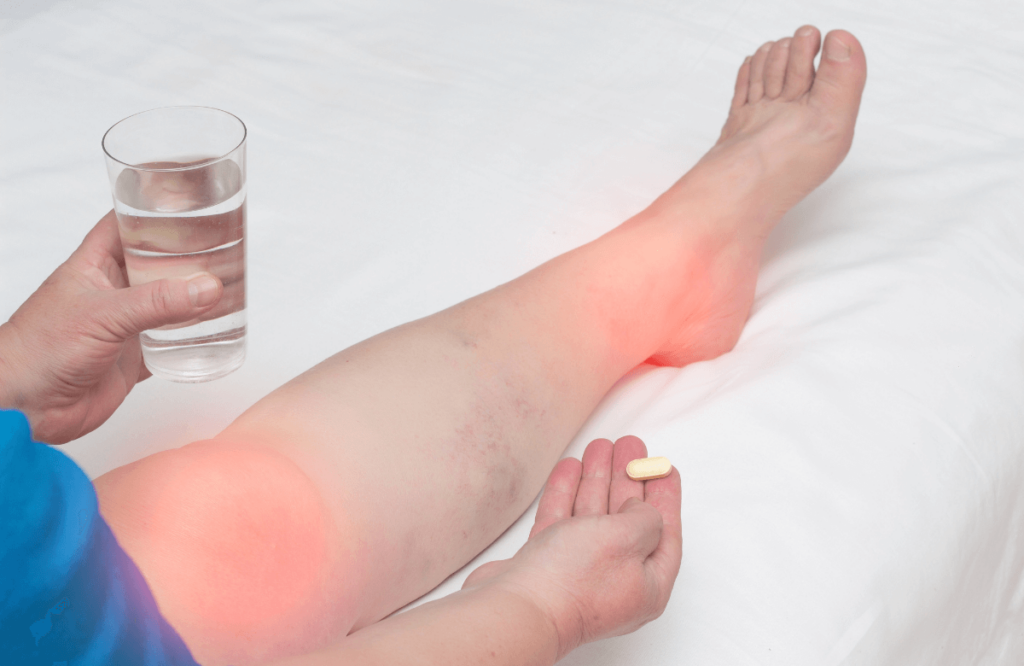
Does Alcohol-Related Swelling Indicate a More Serious Medical Issue?
Alcohol-related swelling can be a sign of a more serious medical issue in some cases. While mild swelling or bloating after alcohol consumption is relatively common and a minor issue, persistent or severe swelling could indicate underlying health concerns.
If you experience any of the following symptoms in tandem, it’s worth speaking to a health professional to discuss potential serious issues.
- Rapid or excessive weight gain
- Swelling in the legs, ankles, or abdomen
- Difficulty breathing or chest pain
- Persistent or worsening symptoms
It’s essential to consult with a healthcare provider if you have concerns about alcohol-related swelling or if you experience any concerning symptoms. They can assess your symptoms, review your medical history, and perform any necessary tests to determine the underlying cause and provide appropriate treatment or further guidance.
Will I Lose Weight If I Stop Drinking?
Many people gain weight when they drink often, and some find that when they cut back or stop altogether, they lose some of that weight. If you retain water after drinking, and there’s no underlying health problem causing the swelling, stopping the habit will certainly help you lose weight. You’ll drop the excess fluid and see a smaller number on the scale.
For long-term weight loss, the answer will differ from person to person. Your results will vary based on lifestyle choices, diet, and exercise habits.
Ultimately, reducing or eliminating alcohol consumption can contribute to weight loss in several ways. For starters, you’ll be consuming fewer calories, assuming you don’t replace the drink with something of equal caloric value.
You might also see better nutrition because alcohol consumption can decrease your nutritional absorption. You’ll also sleep better without alcohol in the system. Both of these benefits mean your body will respond better to what you eat, you’ll feel better, and your organ function will improve, potentially boosting fat loss.
Your metabolic rate can also improve because alcohol temporarily slows your metabolism. Until it runs out of your system, the substance will slow your metabolic rate, causing the calories you consume while drinking to count for more.







